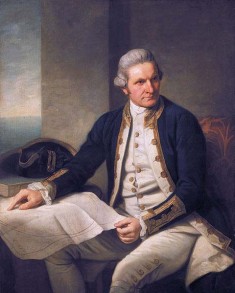| James Cook | |
|---|---|
 |
|
| Explorer | |
| Born | Nov. 7, 1728 Marton, (in present-day Middlesbrough) Yorkshire, England |
| Died | Feb. 14, 1779 (at age 50) Kealakekua Bay, Hawaii |
| Nationality | British |
James Cook was a British explorer and navigator whose voyages charted much of the Pacific lands, including Hawaii, New Zealand, and Australia. He sailed from New Zealand to Australia in his ship called Endeavour. In 1770, he landed at Botany Bay, the place he named due to a variety of different plants that grew in that land. After that discovery, Cook made two more voyages during his lifetime.
Early Life
Captain James Cook was born in 1728 in Marton, Yorkshire, England. He was a second child born to James Cook and Grace Pace. He received a basic education at Postgate School at Great Ayton before he was sent to work for William Sanders in Staithes.
It was here that he developed a love for the sea, but he was not happy with his work amongst the hard-working individuals of the land. In 1746, at the age of 17, he gave into his temptations for the waters and became an apprentice to the Walker Family, which owned several ships at the Whitby port at the time.
Getting Acquainted with Ships
Whitby was a great place, crammed with a large number of ships. His duty required him to become acquainted with the coal ships of the area. He quickly learned all the ins and outs of coal type ships. Cook worked hard and had his very first trip aboard the Whitby collier, named Freelove. The coal ships were renowned for their strong sailing abilities and could carry a great deal of cargo. His expertise in the ship of this type would bring him to employ it for all of his epic expeditions of discovery. While at Whitby, Cook educated himself in math and navigation.
Cook Rises through the Ranks
 By 1752, Cook had risen to a position of mate. In 1755, he was offered a command of a collier, but he turned down the offer. In mid-1755, he made an unusual decision of volunteering in the navy as an ordinary sailor. Cook enlisted on a 60-gun ship Eagle which was on patrol in the English Channel. Within two years, he had risen to a position of master and in 1757, he was shifted to Pembroke, a 64-gun ship that was sent to fight the French in the North American Coast.
By 1752, Cook had risen to a position of mate. In 1755, he was offered a command of a collier, but he turned down the offer. In mid-1755, he made an unusual decision of volunteering in the navy as an ordinary sailor. Cook enlisted on a 60-gun ship Eagle which was on patrol in the English Channel. Within two years, he had risen to a position of master and in 1757, he was shifted to Pembroke, a 64-gun ship that was sent to fight the French in the North American Coast.
Within a few years, Cook worked his way upward through the ranks, ultimately rising high to command his own vessel. This was unusual for an ordinary man in the navy, but his experience gave him an edge over other seamen. His first assignment was to map River St. Lawrence’s estuary before the naval forces of the Wolfe attacked Quebec. Most sailors noted Cook’s work with surveying and mapping and how accurate his drawings were. In 1762, Cook married Elizabeth Batts. They had six children, but three of them died in infancy.
Cook’s Greatest Achievements
Cook’s observations on the sun eclipse in 1766 caused him to be appointed by the Royal Society as their chief observer of the transit of Venus. He also discovered the great southern continents, the present myth at that time, with a second voyage having this as its primary objective. A third expedition was primarily concerned with the Northwest Passage. James Cook discovered new lands almost everywhere. His survey of New Zealand caused him to be considered one of the best surveyors who helped make the British Navy popular.
Cook also recorded several other islands on European maps for the very first time. He mapped large areas of the Pacific accurately and gathered accurate longitude measurements during his three voyages. Cook was in a company of a number of scientists including, Daniel Solander and Joseph Banks, who gathered more than 3,000 plant species. The discoveries of these sailors added to the significance of voyages. Also, he discovered that scurvy could be cured by consuming fruits rich in vitamin C. Cook used to give doses of lime juice to his crew members on a daily basis to prevent them from getting this ailment.
Cook’s Last Years and Legacy
In 1779, at Sandwich Islands, Hawaii, James Cook was murdered in the fight with islanders. They claimed that Cook and his crew were stealing from their boats. Cook retaliated, but he was stabbed in the back. This was his last stop.
Cook’s explorations increased European familiarity of the globe. As the ship captain and experienced cartographer, Captain Cook filled in numerous gaps on world maps. His contributions to 18th century science have helped propel more discoveries.